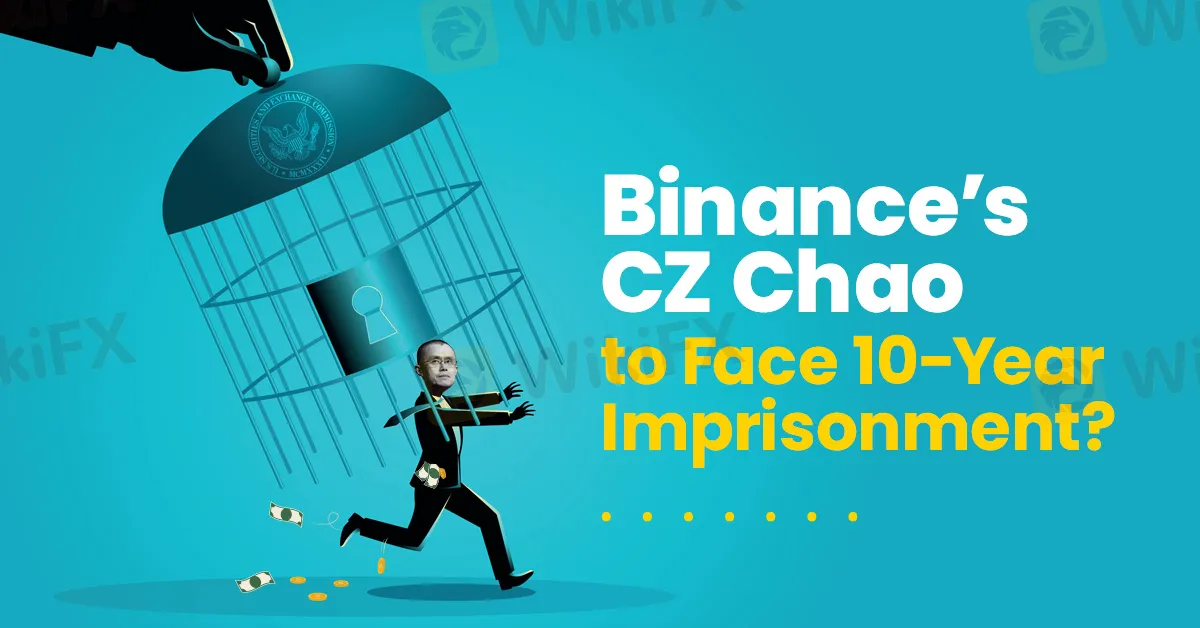简体中文
繁體中文
English
Pусский
日本語
ภาษาไทย
Tiếng Việt
Bahasa Indonesia
Español
हिन्दी
Filippiiniläinen
Français
Deutsch
Português
Türkçe
한국어
العربية
Binance’s CZ Chao to Face 10-Year Imprisonment?
Abstract:As Changpeng Zhao faces legal repercussions for violating anti-money laundering laws, a heated dispute with the US Department of Justice unfolds, impacting Binance significantly.

Changpeng Zhao (CZ), the former CEO of Binance, is currently engaged in a contentious dispute with the US Department of Justice (DOJ) subsequent to his admission of guilt regarding violations of US anti-money laundering laws.
The DOJ, as reported by Coindesk, opposes CZ's departure from the United States despite not pushing for immediate imprisonment, citing concerns of him being a “flight risk.” This position remains firm despite CZ's voluntary appearance in court, which he presented as evidence of his commitment to staying.
CZ's legal representation has emphasized his voluntary self-surrender, expressed his intent to resolve the case, and proposed a substantial bail package. However, US Attorneys argue that the severity of potential sentencing could prompt CZ to flee to the UAE, his primary citizenship, where extradition to the US is uncertain.

Facing a looming prison term of 18 months to a maximum of 10 years following his guilty plea for money laundering violations, CZ stepped down from his role as Binance's CEO.
Simultaneously, Binance admitted guilt to multiple criminal and civil charges, agreeing to pay a significant penalty of $4.3 billion. CZ, upon pleading guilty to violating the Bank Secrecy Act, signed a substantial bond agreement of $175 million, prompting concerns that he might choose to stay in the UAE rather than face US imprisonment.
Subsequent to Zhao's admission of guilt, Binance made an agreement with the DOJ to withdraw from the US market and appoint a new CEO. Amidst this legal turmoil, Binance experienced a substantial decrease in its Bitcoin reserves.
According to data from CryptoQuant, the crypto exchange witnessed a decline of 5,000 BTC in reserves, contrasting with Coinbase, which reported an increase of around 12,000 BTC in the same period.
Changpeng Zhao's resignation and admission of guilt resulted in over $1 billion in outflows from Binance within a day. This departure was accompanied by a 25% decrease in market liquidity, indicating the impact of market makers reducing their positions in response to the legal uncertainties. Additionally, Binance's native token, BNB, saw an 8% decline on the day of settlement.

Disclaimer:
The views in this article only represent the author's personal views, and do not constitute investment advice on this platform. This platform does not guarantee the accuracy, completeness and timeliness of the information in the article, and will not be liable for any loss caused by the use of or reliance on the information in the article.
Read more

CryptoCurrency Regulations in India 2025 – Key Things You Should Know
Cryptocurrency has become a major trend in today’s world. Crypto Experts believe it’s the future, which is why many people are investing heavily in it. But before jumping in, it’s important for crypto enthusiasts to understand the key rules about cryptocurrency in India.

Global Brokers Vs. Indian Rules: Why They Struggle in India
RBI issued a warning last year against 75 forex brokers. Those brokers are globally popular and regulated in other countries, but they are banned in India. Only few brokers even have physical offices located in India. So, why do global brokers face so many challenges in entering the Indian market?

Tokenized Stocks: Innovation or Just Another Wrapper?
While tokenized stocks promise global, round-the-clock trading, many platforms only offer synthetic exposure similar to CFDs. Without shareholder rights or deep liquidity, their added value remains in question.

Crypto Craze Fizzling Out? Here is Why
The Crypto Craze among users is fading out. The wave of Cryptocurrency has slowed down. But what are the major reasons why this has happened?
WikiFX Broker
Latest News
Global Brokers Vs. Indian Rules: Why They Struggle in India
Services Surveys Signal 'Expansion' In June, Inflation Fears Remain High
ASIC cancels AFS licences of Ipraxis and Downunder Insurance Services
CFD Brokers Face Dual Compliance Pressures Ahead of 2026: Australia and EU Tighten Rules
FxPro to Launch Crypto Trading Desk, Deepening Digital Asset Push
CFI Financial Group Becomes Official Online Trading Partner of Etihad Arena
Discover 5 Benefits of Trading with Trive FX Broker
Major Risks Associated with AuxiliumFX: You Need to Know
IPO market gets boost from Circle's 500% surge, sparking optimism that drought may be ending
Asia-Pacific markets trade mixed ahead of Trump's deadline for higher tariffs
Currency Calculator


